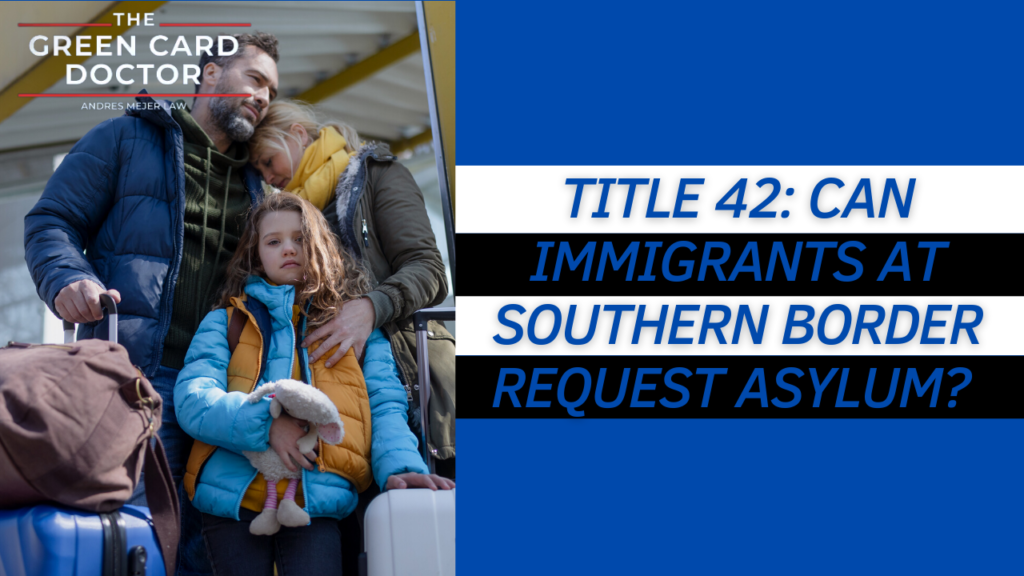INTRODUCTION
Have you heard about Title 42, which affects migrants entering the US and those seeking asylum?
DISCUSSION
What is Title 42?
Title 42 is a provision under the US Health Law invoked during the Trump Administration during the COVID-19 pandemic, which turned away and expelled migrants entering the country’s borders, seeking asylum or legal entry for humanitarian reasons.
This provision gives the Director of the Centers for Disease Control and Prevention (CDC) the authority to suspend entry of individuals from COVID-impacted areas to prevent the spread of the virus that would endanger the general public.
As a result, migrants seeking a better life in the United States have been sent back to their home countries without the opportunity to contest their expulsion or seek asylum.
Now let’s clarify some common inquiries about Title 42.
Clarification #1: Does Title 42 remain effective?
In April 2022, the Biden administration released a memo detailing the government’s plan to terminate Title 42.
The CDC determined that Title 42 was no longer necessary because various mitigating measures, such as access to vaccinations, are now available.
However, on May 2022, a preliminary injunction from a Federal court prohibited Title 42 from being lifted, in response to a complaint filed by 24 states asserting that the health agency neglected to examine the impact of such a decision on immigration enforcement.
Hence, Title 42 remains to be in effect.
Clarification #2: How does Title 42 affect immigration if it remains in effect?
The swift expulsion or expedited removal of migrants entering the US borders will continue to be in place.
Since its invocations, millions of adults and families have been expelled and sent back to their home country, from which they initially fled. Some reports indicate that the policy also contributed to the separation of families, with unaccompanied children attempting to enter the borders.
Additionally, increased repeat encounters of individuals crossing the border (on their second and succeeding attempts) have also been recorded.
Furthermore, the health and well-being of migrants remain to be impacted. Several reports have cited migrants or asylum seekers kidnapped, sexually harassed, or subjected to physical assault. Other studies further indicate the increase in mental health issues for these migrants such as anxiety, depression, PTSD, and others.
Moreover, some health experts have asserted that the rule is counterproductive in preserving health and protecting individuals from COVID-19. The unfavorable conditions – such as overcrowding, increased close contact, lack of medical tests, and unavailability of appropriate medicine – at the borders or at detention centers while individuals are detained or transported back put their health at risk.
Clarification #3: How does Title 42 affect immigration if it is lifted?
Those who are against the lifting of the rule argue that such action will “increase border crossings, thereby increasing the financial burden of providing required healthcare and educational services for those individuals”.
The increase in immigration activity once Title 42 is ended is also expected to overcrowd the border and result to further shelter capacity issues – which similarly would pose health risks
However, other groups argue that lifting the provision will afford immigrants their legal right to seek asylum or due process, and help avoid families from separating themselves as unaccompanied children attempt to re-enter the US borders.
In its April memo, the Biden administration has also laid out measures to mitigate the anticipated surge in immigration activity. These include:
- Increasing personnel and medical support at the borders;
- Improving the efficiency of border processing;
- Strictly enforcing immigration laws to discourage repeat and unlawful entries;
- Expanding the capacity of NGOs to receive noncitizens;
- Disrupting smugglers and criminal organizations that traffic humans; and
- Coordinating with countries on the southern border to further address migration.
Nevertheless, these anticipated consequences are yet to be observed in the coming weeks, as decisions over Title 42 are being contested.
If you ever need an experienced lawyer to handle your immigration case, we at Andres Mejer Law will be happy to legally assist you.




